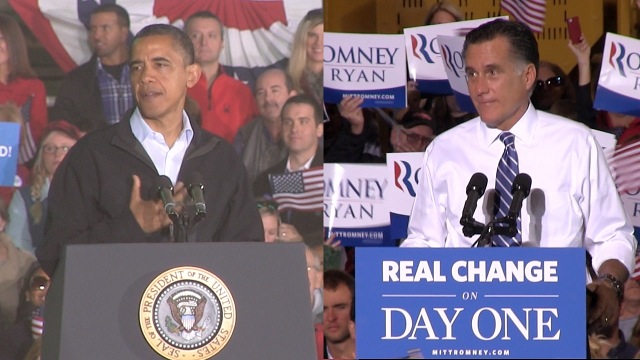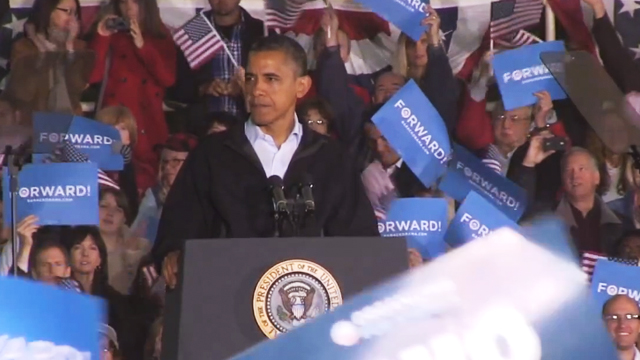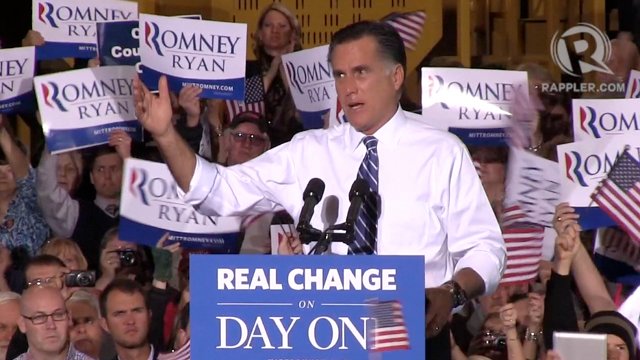SUMMARY
This is AI generated summarization, which may have errors. For context, always refer to the full article.

OHIO, USA – A divided America goes to the polls Tuesday, November 6, to decide the close presidential race between Democrat President Barack Obama and Republican candidate Mitt Romney.
The final national polls showed an effective tie, with either Romney or Obama favored by a single point in most surveys, reflecting the polarized politics of a deeply divided nation.
Obama however led by 3 points in national polls conducted by Pew Research and by the Washington Post and ABC News, suggesting that if either candidate could boast of 11th-hour momentum, it was the 44th US president.
Analysis of the surveys show Obama is leading the race as far as the decided states go. But the remaining swing states could still give the race to Romney. The Republican candidate has a difficult but possible path to the necessary 270 electoral votes to win the election.
The 50 states and Washington D.C. are assigned corresponding electoral votes depending on their population. CNN numbers estimate Obama getting a guaranteed 196 electoral votes from 15 decidedly blue states including very populated ones such as California (55), New York (29), and Illinois (20). Three other states with a total 41 electoral votes are also leaning toward Obama. This gives Obama a starting point of 237 electoral votes.
Romney starts with at least 180 electoral votes coming from 22 decidedly red states including Texas (38). Two states with 26 electoral votes are leaning Republican, which gives Romney a starting point of 206 electoral votes. While Romney is expected to win more states than Obama, most of the red states have small populations and thus are equivalent to smaller number of electoral votes.
The remaining 8 swing states – meaning states that could go either way – have a total 95 electoral votes. Obama needs 33 to win. Romney needs 64. (CNN has called North Carolina a state leaning toward Romney. Other maps still put it as a swing state.)
In the swing states, the race will go down to ground game. How many of the Obama and Romney supporters will go out to vote? Voter turnout in the US was 58% in the 2008 presidential elections. It’s low compared to the Philippines’s 75% in the 2010 polls.
Early voting is allowed in many states in the U.S. In campaign events attended by party members, both Obama and Romney have called on their supporters to get friends, relatives, and neighbors to go out and vote.
Surveys show Obama is favored by women and Romney, by men. Not surprisingly, Romney is favored by whites while Obama is favored by nonwhites. Young adults favor Obama while senior prefer Romney.
Fil-Ams join the polls

Among those who are expected to troop to the voting precincts – or have voted already – are 700,000 Filipino-Americans mostly in the West Coast (49%), particularly California. Like the rest of the population, they are concerned with issues affecting the economy, immigration, job creation, and health care.
Based on the September 2012 National Asian American Survey, although most Filipino-American voters favored Obama in 2008, they are now slightly in favor of the Republican Party – 27% to 24%.
The same survey noted that many Filipino-Americans are devoutly Catholic.
“I cannot vote for Democrats because of abortion and gay marriage,” said Leandro Tapay, director of the Catholic Diocese of Columbus, Ohio.
“I think that is not the way how society is supposed to be. There are millions of unborn babies that have been killed. It’s worse than Germany during the Nazis. I cannot vote for a party that espouses abortion and gay marriage,” he added.
But he also did not vote for Romney because he thinks the Republicans only protected the rich. He voted for an unknown independent presidential candidate.
A number of Filipino-Americans are also seeking elected positions. According to the Philippine Embassy in Washington, at least 2 Filipino Americans are running for seats in the US House of Representatives and 15 others vyings for state legislative seats.
Lacking in political force?

There are 3.4 million Filipino-Americans. But despite their number, they have been unable to turn themselves into a political force. The registered voters only comprise 17.5% of the population.
One reason cited by Filipino-Americans interviewed by Rappler is they migrated to the US for economic reasons. Many of them have jobs that pay by the hour.
Another reason is most Filipino-Americans are residing in non-swing states, where presidential candidates hardly schedule campaign events except mostly to raise funds.
California, where 43% of Fil-Ams are located, is a solid Democratic state. Except for Texas (4%), the CNN map shows the other states populated by Filipino-Americans are solid Democratic states – Hawaii (10%), Illinois (4.1%), and Washington (4%).
They don’t get the attention that groups located in Ohio and Florida do. It’s one of the old rules of American politics. Where you live is as important as who you are.
But when it comes to local races, there are pockets in the US where Fil-Ams have made a mark politically. Some of the areas are California and Hawaii. A number of Filipino-Americans are even seeking elected positions in California.
Hawaii elected the first Filipino-American Governor in US history – Ben Cayetano. He is now running for Honolulu mayor and is rallying Filipino-Americans there to oppose a proposed rail project.
Ties with PH
Republican Sen John McCain said he sees stronger military ties between Washington and Manila under a Romney presidency, particularly toward efforts to curb the aggressiveness of China in the South China Sea (West Philippine Sea) dispute.
“We are looking at a rising China that is sparking confrontaton in the region, including with the government of the Philippines. Mitt Romney understands that. He understands the need of a strong and large American Navy,” McCain told Rappler.
The Philippines is America’s “strategic ally in Asia-Pacific. Obama and Romney “pretty much agree on foreign policy,” US Ambassador Harry Thomas told Rappler executive editor Maria Ressa in Manila. But when it comes to the military, he agreed with McCain. “If Governor Romney is elected, clearly, there will be a rebalance toward the military.”
Senior American journalists observing Romney doubt that he would favor the Philippines over China for the simple reason that he is a businessman who would likely want to develop a good relationship with the communist country.
Important congressional
Foreign Service posts in the US have campaigned for Filipino-Americans to participate in the electoral process and become a “force” in the 2012 elections.
On Monday night, November 5, Philippine Ambassador to the US Jose Cuisia Jr called on them to go out and vote. “The United States is host to the largest concentration of Fililipinos outside the Philippines and Filipinos are the second largest ethnic group in America,” he said.
“Let us use these numbers and play a bigger role in shaping the political, economic, and social discourse in this country,” he added.
Department of Foreign Affairs U.S. division director Senen Mangalile said it’s not only the presidential elections that matter. The congressional races are also important.
There are various bills in the US Congress that the Philippine government has been closely watching because these will affect, among others, economic and trade relations between the Philippines and the United States.
Proposed bills
Among the bills that the Philippine government is watching are:
1. Bills on outsourcing. There has been a growing anti-outsourcing sentiment in the US given its unemployment problems. US companies provide a lot of outsourcing work to the Philippines. Any legislation on the industry could affect jobs in the Philippines.
2. Save our Industries Act. The Philippines is supporting a bill that will exempt from taxes garments from the Philippines. If passed, this is expected to create local jobs.
3. More support for defense and security cooperation and allotment of military assistance.
4. Extending benefits to widows of World War II veterans
5. The Dream Act. A bill that would give permanent residency to certain children who came to the US as illegal immigrants and graduated from American high schools.
Other ethnic groups have succesfully organized to push their agenda.
“We could look at the affirmative action on the African-American community who were able to mobilize to ensure that colleges made special consideration and gave favor to African-Americans in their acceptance to balance historical disfavor. It literally changed African-American political power in the US,” pollster Julia Clark said.
The groups that are able to mobilize are paid attention to by politicians because they can have the power to change votes in certain states, she added. – with reports from Agence France-Presse/Rappler.com
Add a comment
How does this make you feel?
There are no comments yet. Add your comment to start the conversation.